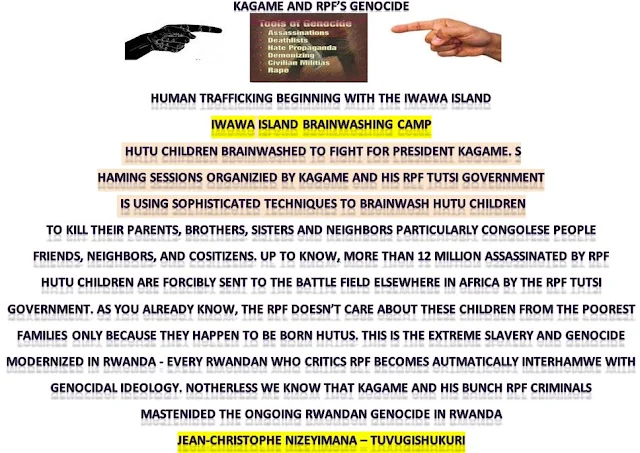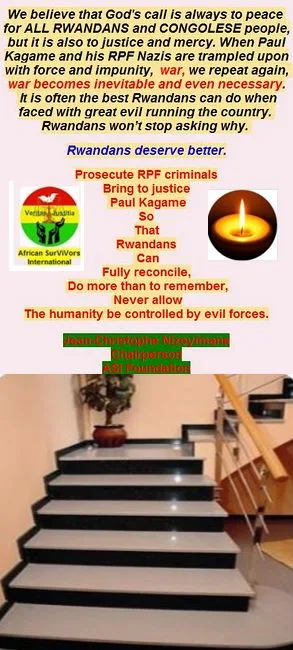A Candle For Remembering

May this memorial candle lights up the historical past of our beloved Country: Rwanda, We love U so much. If Tears could build a stairway. And memories were a lane. I would walk right up to heaven. To bring you home again. No farewell words were spoken. No time to say goodbye. You were gone before I knew it And. Only Paul Kagame knows why. My heart still aches with sadness. And secret tears still flow. What It meant to lose you. No one will ever know.
Rwanda: Cartographie des crimes
Let us remember Our People
You can't stop thinking
Welcome to Home Truths
Everybody Hurts
KAGAME - GENOCIDAIRE
Paul Kagame admits ordering...
Why did Kagame this to me?
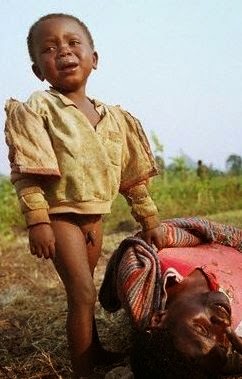
Can't forget. He murdered my mother. What should be my reaction? FYI: the number of orphans in Rwanda has skyrocketed since the 1990's Kagame's invasion. Much higher numbers of orphans had and have no other option but joining FDLR fighters who are identified as children that have Lost their Parents in Kagame's Wars inside and outside of Rwanda.If someone killed your child/spouse/parent(s) would you seek justice or revenge? Deep insight: What would you do to the person who snuffed the life of someone I love beyond reason? Forgiving would bring me no solace. If you take what really matters to me, I will show you what really matters. NITUTIRWANAHO TUZASHIRA. IGIHE KIRAGEZE.If democracy is to sell one's motherland(Africa), for some zionits support, then I prefer the person who is ready to give all his live for his motherland. Viva President Putin!!!
RPF committed the unspeakable
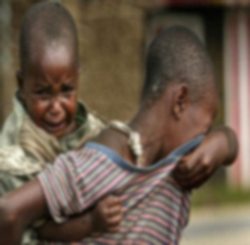
The perverted RPF committed the UNSPEAKABLE.Two orphans, both against the Nazi world. Point is the fact that their parents' murder Kagame & his RPF held no shock in the Western world. Up to now, the Rwandan Hitler Kagame and his death squads still enjoy impunity inside and outside of Rwanda. What goes through someone's mind as they know RPF murdered their parents? A delayed punishment is actually an encouragement to crime, In Praise of the ongoing Bloodshed in Rwanda. “I always think I am a pro-peace person but if someone harmed someone near and dear to me, I don't think I could be so peaceful. I would like to believe that to seek justice could save millions of people living the African Great Lakes Region - I would devote myself to bringing the 'perp' along to a non-happy ending but would that be enough? You'd have to be in the situation I suppose before you could actually know how you would feel or what you would do”. Jean-Christophe Nizeyimana, Libre Penseur
Inzira ndende
Search
Hutu Children & their Mums
Look at them ! How they are scared to death. Many Rwandan Hutu and Tutsi, Foreign human rights advocates, jounalists and and lawyers are now on Death Row Waiting to be murdered by Kagame and his RPF death squads. Be the last to know.
Rwanda-rebranding
Ways To Get Rid of Kagame
- The people should overthrow the Rwandan dictator (often put in place by foreign agencies) and throw him, along with his henchmen and family, out of the country – e.g., the Shah of Iran, Marcos of Philippines.Compaore of Burkina Faso
- Rwandans organize a violent revolution and have the dictator killed – e.g., Ceaucescu in Romania.
- Foreign powers (till then maintaining the dictator) force the dictator to exile without armed intervention – e.g. Mátyás Rákosi of Hungary was exiled by the Soviets to Kirgizia in 1970 to “seek medical attention”.
- Foreign powers march in and remove the dictator (whom they either instated or helped earlier) – e.g. Saddam Hussein of Iraq or Manuel Noriega of Panama.
- The dictator kills himself in an act of desperation – e.g., Hitler in 1945.
- The dictator is assassinated by people near him – e.g., Julius Caesar of Rome in 44 AD was stabbed by 60-70 people (only one wound was fatal though).
- Organise strikes and unrest to paralyze the country and convince even the army not to support the dictaor – e.g., Jorge Ubico y Castañeda was ousted in Guatemala in 1944 and Guatemala became democratic, Recedntly in Burkina Faso with the dictator Blaise Compaoré.
Almighty God :Justice for US
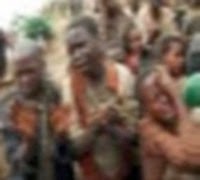
Hutu children's daily bread: Intimidation, Slavery, Sex abuses led by RPF criminals and Kagame, DMI: Every single day, there are more assassinations, imprisonment, brainwashing & disappearances. Do they have any chance to end this awful life?
Killing Hutus on daily basis

RPF targeted killings, very often in public areas. Killing Hutus on daily basis by Kagame's murderers and the RPF infamous death squads known as the "UNKNOWN WRONGDOERS"
RPF Trade Mark: Akandoya
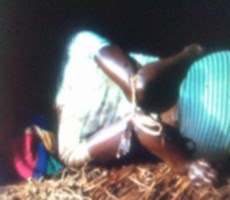
Rape, torture and assassination and unslaving of hutu women. Genderside: Rape has always been used by kagame's RPF as a Weapon of War, the killings of Hutu women with the help of Local Defense Forces, DMI and the RPF military
The Torture in Rwanda flourishes
Fighting For Our Freedom?
We need Freedom, Liberation of our fatherland, Human rights respect, Mutual respect between the Hutu majority and the Tutsi minority
KAGAME VS JUSTICE
REPORT OF THE
MAPPING EXERCISE DOCUMENTING THE MOST SERIOUS VIOLATIONS OF HUMAN RIGHTS AND
INTERNATIONAL HUMANITARIAN LAW IN THE DEMOCRATIC REPUBLIC OF THE CONGO BETWEEN
1993 AND 2003
Main navigation
·
Home
·
Attacks
against hutu refugees in the Mugunga and Lac Vert camps (North Kivu)
Mapping Report > Section I. Most serious violations > CHAPTER II. First Congo War > B. Attacks against Hutu refugees > 2. North Kivu > Mugunga and Lac
Vert camps
After the fall of the FAZ military camp in Rumangabo on 29 October, AFDL/APR soldiers launched an attack on Goma and took control of the town on 1 November 1996. For several days, the ex-FAR/Interahamwe from the Mugunga and Lac Vert camps and Mayi-Mayi armed groups from Sake blockaded the AFDL/APR soldiers seven kilometres from the Mugunga camp. Some of the refugees took advantage of this situation to leave the camps and move towards the town of Sake. On 12 November, however, after entering into an alliance with the local Mayi-Mayi, the AFDL/APR soldiers took control of the hills around Sake and surrounded the refugees who were gathered between the Mugunga camp and the town.
·
On 14 November
1996, AFDL/APR soldiers fired indiscriminately with heavy weapons at the
Mugunga camp and the surrounding area for six hours, allegedly killing an
unknown number of refugees.237
In the afternoon of 14 November, after violent clashes with the Mayi-Mayi at Sake, the ex-FAR/Interahamwe in the Mugunga camp broke through the cordon and fled in the direction of Masisi, taking many refugees with them.
·
Around 14 November
to 15 November 1996, the AFDL/APR soldiers positioned in the hills around Sake
allegedly killed a large number of refugees who were attempting to flee in the
direction of Masisi, firing at them indiscriminately with heavy weapons and
machine guns. Hundreds of bodies of refugees were buried in a mass grave on the
Madimba coffee plantation near Sake.238
On 15 November 1996, while the
Security Council was giving the green light to the deployment of a
multinational force in eastern Zaire, AFDL/APR soldiers entered the Mugunga camp
and ordered the refugees still present in the camp to return to Rwanda.239 Between
15 November and 19 November 1996, several hundred thousand refugees left the
Mugunga and Lac Vert camps and returned to Rwanda.240
· On 15 November 1996, AFDL/APR units allegedly killed refugees in and around the Mugunga camp. A journalist who entered the camp on 16 November counted 40 victims who were shot dead or killed with cold weapons, including women, children and two babies.241 An unknown number of refugees were reportedly killed between Mugunga and the town of Sake. On 19 November, volunteers from the Zairian Red Cross in Goma collected and buried 166 bodies found along the road between the town of Sake and the perimeter of the Mugunga camp.242
Many witnesses reported the existence of a checkpoint between the Mugunga and Lac Vert camps where the AFDL/APR units would sort refugees according to their age and sex. Generally speaking, the soldiers allowed women, children and the elderly to pass through. Men, on the other hand, were very often arrested and executed. In this context, the Mapping Team documented the following alleged incidents:
· Between 15 November and 16 November 1996, AFDL/APR units arrested an unknown number of Rwandan Hutu men from the Lac Vert camp and Mugunga and executed them. Some were bound and then thrown alive into Lac Vert, where they drowned. Others were shot in the head and their bodies dumped in the lake.243
·
The killings around
Mugunga and Lac Vert continued for several weeks. Some survivors have recounted
how they were attacked by AFDL/APR soldiers in late November 1996 when they
were seeking repatriation to Rwanda. Some of the refugees were rounded up when
they came out of the Park and then executed. One source reported the existence
of several mass graves inside the park, five kilometres from the Mugunga camp.244
IN RWANDA AND IN THE DRC AS WELL
Rwanda vs Ukraine
BY YVES ENGLER[Since 1994, the world witnesses the horrifying Tutsi minority (14%) ethnic domination, the Tutsi minority ethnic rule with an iron hand, tyranny and corruption in Rwanda. The current government has been characterized by the total impunity of RPF criminals, the Tutsi economic monopoly, the Tutsi militaristic domination, and the brutal suppression of the rights of the majority of the Rwandan people (85% are Hutus)and mass arrests of Hutus by the RPF criminal organization =>AS International]
Overview
The Rwandan Patriotic Front (RPF), led by President Paul Kagame, has ruled the country since 1994, when it ousted forces responsible for that year’s genocide and ended a civil war. While the regime has maintained stability and economic growth, it has also suppressed political dissent through pervasive surveillance, intimidation, torture, and renditions or suspected assassinations of exiled dissidents.
·
Political
opposition figure Paul Rusesabagina, who had lived abroad until he was forcibly
repatriated by Rwandan authorities in 2020, was sentenced to 25 years in prison
on terrorism and other charges in September after a trial that lacked due
process.
·
Draconian
lockdowns related to the COVID-19 pandemic were generally eased during the
year, though some restrictions remained in place or were reimposed by December.
· The Kagame regime continued its attempts to silence political opponents, with suspicious murders or disappearances reported abroad and further detentions of and threats against journalists, bloggers, and artists occurring within the country.
A1 0-4 pts
|
Was the current head of government or other chief national
authority elected through free and fair elections? |
0 4 |
Rwanda’s 2003
constitution grants broad powers to the president, who has the authority to
appoint the prime minister and dissolve the bicameral Parliament. Amendments
passed in 2015 retained a two-term limit for the presidency and shortened terms
from seven to five years. The changes also explicitly stated, however, that
incumbent Paul Kagame was eligible for an additional seven-year term, after
which he could run for two of the new five-year terms. This would extend
Kagame’s rule until 2034.
Kagame easily
won the 2017 presidential election, taking 98.8 percent of the vote, according
to official results. Frank Habineza of the Democratic Green Party of Rwanda
(DGPR) and independent Philippe Mpayimana split the remainder. The electoral
process was marred by numerous irregularities, including political
intimidation, unfair registration practices, and alleged fraud during the
balloting itself.
Local
authorities impeded the electoral campaigns of opposition presidential
candidates, and some citizens were coerced into joining RPF rallies and voting
for Kagame. Rwandans were also made to attend camps and listen to RPF
propaganda, while local authorities tasked traditional leaders with persuading
their communities to vote for Kagame. Access to the media and the content of
electoral coverage were both skewed in favor of the RPF.
On election
day, observers reported ballot stuffing, poll workers showing favoritism toward
the RPF, and denial of access to the vote-counting process, among other
violations. Ballot secrecy was not always respected.
A2 0-4 pts
|
Were the current national legislative representatives
elected through free and fair elections? |
1 4 |
The 26-seat
Senate, the upper house of Parliament, consists of 12 members elected by
regional councils; 8 appointed by the president; 4 chosen by the National
Consultative Forum for Political Organizations (NCFPO), a public body meant to
promote political consensus; and 2 elected by faculty at universities.
Senators’ terms were shortened from eight to five years as part of the 2015
constitutional reform. The 80-seat Chamber of Deputies, the lower house,
includes 53 directly elected members, 24 women chosen by local councils, 2
members from the National Youth Council, and 1 member from the Federation of
Associations of the Disabled, all serving five-year terms.
Six incumbent
senators who had served eight-year terms were replaced in 2020; four were
appointed by Kagame, and two were selected by the NCFPO.
The RPF
dominated the Chamber of Deputies elections held in 2018, capturing 40 of the
53 elected seats. The DGPR gained 2 seats, marking the first time a genuine
opposition party had won representation in Parliament. Three other parties
allied with the RPF—the Social Democratic Party, the Liberal Party, and the
Social Party—won 5, 4, and 2 seats respectively. As with other elections in
recent years, the government’s repression of legitimate opposition parties and
strict control of the media helped to ensure an overwhelming victory for the
RPF.
A3 0-4 pts
|
Are the electoral laws and framework fair, and are they
implemented impartially by the relevant election management bodies? |
1 4 |
The electoral
laws are not impartially implemented by the NEC, whose members are proposed by
the government and appointed by the RPF-dominated Senate. Rwandan elections
routinely feature unfair barriers to registration, campaigning, poll
monitoring, and media access for opposition parties and candidates, among other
problems.
The 2015
constitutional amendments were adopted through a flawed petition and referendum
process. Rights groups and news organizations cited reports that some
signatures on the petition were not given voluntarily. The details of the
amendments were not widely distributed or discussed ahead of the referendum, in
which 98 percent of voters signaled their approval, according to the NEC. The
government limited the political activities of groups opposed to the
amendments, and the referendum was not monitored by any independent
international observer groups.
B Political
Pluralism and Participation
B1 0-4 pts
|
Do the people have the right to organize in different
political parties or other competitive political groupings of their choice,
and is the system free of undue obstacles to the rise and fall of these
competing parties or groupings? |
1 4 |
The
government-controlled Rwanda Governance Board (RGB) is responsible for
registering political parties. In practice it can deny registration at its
discretion without proper justification.
The
government has a long history of repressing its political opponents, and
members of opposition parties face the threat of disappearance, arbitrary
arrest and detention, and assassination. Diane Rwigara, who sought to contest
the 2017 presidential election, was arrested and imprisoned that year, along
with her mother and sister, on multiple charges. The charges against her sister
were dropped; Rwigara and her mother were released on bail in 2018 and
acquitted later that year. Separately, several members of the Dalfa-Umurinzi
party, led by 2010 presidential candidate Victoire Ingabire, were convicted in
2020 of involvement with an “irregular armed force” and “offenses against the
state,” receiving prison terms ranging from 7 to 10 years. One defendant who was
acquitted, Venant Abayisenga, was reported missing later that year and was
believed to have been forcibly disappeared or killed.
B2 0-4 pts
|
Is there a realistic opportunity for the opposition to increase its support or gain power through elections? |
0 4 |
The RPF has
ruled Rwanda without interruption since 1994, banning and repressing any
opposition group that could mount a serious challenge to its leadership. All
registered parties currently belong to the NCFPO. While the DGPR won two
parliamentary seats in 2018, current conditions generally prevent it from
gaining further positions of authority or increasing its support to the point
where it can viably compete with the RPF.
B3 0-4 pts
|
Are the people’s political choices free from domination by
forces that are external to the political sphere, or by political forces that
employ extrapolitical means? |
0 4 |
Both voters
and candidates face significant intimidation aimed at controlling their
political choices. Rwandans living outside the country have been threatened,
attacked, forcibly disappeared, or killed, apparently in retaliation for their
public or suspected opposition to the regime.
B4 0-4 pts
|
Do various segments of the population (including ethnic, racial, religious, gender, LGBT+, and other relevant groups) have full political rights and electoral opportunities? |
1 4 |
The
constitution calls on the president to ensure “representation of historically
marginalized communities” in the Senate through his appointees. However,
asserting one’s ethnic identity in politics is banned, meaning the level of
representation is unclear. The prohibition on discussion of ethnicity makes it
nearly impossible for disadvantaged groups—including the Twa, an Indigenous
group—to organize independently and advocate for their interests.
The
constitution requires women to occupy at least 30 percent of the seats in each
chamber of Parliament. While women currently hold more than 38 percent of
Senate seats and about 61 percent of the lower house seats, they have little
practical ability to engage in politics outside the RPF structure. The
promotion of gender equity disproportionately privileges English-speaking
Tutsis over French-speaking Hutus and rural Tutsis. Societal discrimination, as
well as the regime’s general repression of dissent, prevents LGBT+ Rwandans
from freely pursuing their communities’ political interests.
C1 0-4 pts
|
Do the freely elected head of government and national
legislative representatives determine the policies of the government? |
1 4 |
Government
policy is largely set and implemented by the executive branch, with the
security and intelligence services playing a powerful role, and the president
is not freely elected. Parliament, which generally lacks the independence to
serve as a check on executive authority, tends to merely endorse presidential
initiatives.
C2 0-4 pts
|
Are safeguards against official corruption strong and
effective? |
2 4 |
The
government takes measures to limit corruption, including regular dismissals and
prosecutions of low-level officials who are suspected of malfeasance. In 2018,
Parliament passed penal code revisions that expanded the list of
corruption-related crimes and increased penalties for those convicted. In 2019,
several mayors and other local officials resigned or were dismissed for alleged
corruption and other misconduct, though the lack of transparency surrounding
the cases made it difficult to assess whether any of them were politically
motivated. In 2021, Rwanda’s Office of the Ombudsman launched investigations
following a civil society report that found corruption in the public procurement
and infrastructure sectors.
Despite these
actions, graft remains a problem, and only a few independent organizations or
media outlets are able to investigate or report on corruption issues due to the
risk of government reprisals.
C3 0-4 pts
|
Does the government operate with openness and transparency? |
1 4 |
While a 2013
law provides for public access to government information, implementation has
been weak. Data published on Sobanukirwa, a website created by the government
to ease the process of requesting access to documents, suggest that only a
small fraction of requests result in positive and timely responses. Given the
government’s active repression of any dissent in recent years, citizens do not
have the ability in practice to obtain information about state operations, nor
do they have a meaningful opportunity to comment on policy without the threat
of punishment.
D Freedom
of Expression and Belief
D1 0-4 pts
|
Are there free and independent media? |
0 4 |
While the
constitution nominally protects freedom of the press, the government imposes
legal restrictions and informal controls on the media, and most outlets
practice self-censorship. The few journalists in the country who engage in
independent reporting are subject to criminal charges and intimidation. The
penal code revisions passed in 2018 criminalized cartoons and writings that
“humiliate” Rwandan leaders, but also decriminalized defamation, which the
Rwanda Journalists Association considered an improvement to the highly
restrictive legal framework.
Many Rwandan
journalists have fled the country and work in exile. Due in part to this
phenomenon, the government has increasingly blocked access to news services and
websites based abroad. The British Broadcasting Corporation’s
Kinyarwanda-language service has been suspended in the country since 2014.
Authorities
continued to target journalists and bloggers—particularly those broadcasting
via the online video platform YouTube—for intimidation, arrest, or prosecution
during 2021, using a broad interpretation of media laws that allow them to
restrict content that is deemed offensive, false, or contrary to public safety
and public morals.
D2 0-4 pts
|
Are individuals free to practice and express their
religious faith or nonbelief in public and private? |
2 4 |
Religious
freedom has historically been respected, but the government has recently taken
steps to assert greater control over religious institutions. Over the past
several years, authorities have shut down Pentecostal churches and some
mosques, banned mosques in Kigali from broadcasting the call to prayer, passed
a law requiring religious leaders to obtain a theology degree before
establishing churches, mandated that religious organizations report grants to
the RGB, and required that donations to faith-based groups be deposited in
Rwandan banks. Jehovah’s Witnesses face arrest for refusing to participate in
security duties or oath-taking involving the national flag.
D3 0-4 pts
|
Is there academic freedom, and is the educational system
free from extensive political indoctrination? |
1 4 |
The
government restricts academic freedom by enforcing official views on the
genocide and other sensitive topics. Any critical discussion of the RPF’s
actions during the war or its politicization of memorialization projects is
heavily policed. Scholars and students are subject to suspension for
“divisionism” and engage in self-censorship to avoid such penalties.
In 2019, the
government announced that primary schools would conduct lessons in English,
even though most of the population speaks Kinyarwanda. French-speaking students
and educators could also be disadvantaged by the decision. School closures
related to the COVID-19 pandemic delayed enforcement of the new policy during
2020, but implementation began in early 2021 as schools reopened.
D4 0-4 pts
|
Are individuals free to express their personal views on
political or other sensitive topics without fear of surveillance or
retribution? |
0 4 |
The space for
free private discussion is limited in part by indications that the government
monitors personal communications. Social media are heavily monitored, and the
law allows for government hacking of telecommunications networks. In 2019,
WhatsApp disclosed that its messaging service had been exploited to target
Rwandan dissidents with Pegasus, a suite of surveillance software. Rwandan
authorities have also used mobile data and geolocation tools as part of their
response to COVID-19.
In addition
to electronic surveillance, the authorities reportedly use informants to
infiltrate civil society, further discouraging citizens from voicing dissent.
Individuals have been forcibly disappeared, arrested, detained, and
assassinated for expressing their views. Innocent Bahati, a poet known for
reciting his social commentary on YouTube, went missing in February 2021; his
location and condition remained unknown at year’s end.
E Associational
and Organizational Rights
E1 0-4 pts
|
Is there freedom of assembly? |
0 4 |
Although the
constitution guarantees freedom of assembly, this right is strictly limited in
practice. Fear of arrest or police violence serves as a deterrent to protests,
and gatherings are sometimes disrupted even when organizers obtain official
authorization. Public gatherings have been restricted to varying degrees during
the COVID-19 pandemic, with those deemed to be in violation of the rules facing
arrest and possible mistreatment in custody. Nevertheless, some officially
sanctioned events proceeded peacefully during 2021. LGBT+ activists organized
Rwanda’s first pride celebrations in June.
E2 0-4 pts
|
Is there freedom for nongovernmental organizations,
particularly those that are engaged in human rights– and governance-related
work? |
1 4 |
Registration
and reporting requirements for both domestic and foreign nongovernmental
organizations (NGOs) are onerous, and activities that the government defines as
divisive are prohibited. Many organizations receive funds from the RGB, which
challenges their independence. Several NGOs have been banned in recent years,
leading others to self-censor. The government has been accused of employing
infiltration tactics against human rights organizations.
E3 0-4 pts
|
Is there freedom for trade unions and similar professional
or labor organizations? |
1 4 |
The
constitution provides for the rights to form trade unions, engage in collective
bargaining, and strike, but free collective bargaining and strikes are limited
by binding arbitration rules and rare in practice. Public-sector workers and
employees in broadly defined “essential services” are generally not allowed to
strike. Enforcement of rules against antiunion discrimination is weak. The
country’s largest union confederation has close ties to the RPF, and the
government allegedly interferes in union elections.
F1 0-4 pts
|
Is there an independent judiciary? |
0 4 |
The Rwandan
judiciary lacks independence from the executive. Top judicial officials are
appointed by the president and confirmed by the RPF-dominated Senate. Judges
rarely rule against the government in politically sensitive cases.
F2 0-4 pts
|
Does due process prevail in civil and criminal matters? |
1 4 |
The police
and military regularly engage in arbitrary arrests and detentions, targeting
opposition figures and dissidents as well as homeless people, street vendors,
and suspected petty criminals. A 2017 Human Rights Watch (HRW) report detailed
a system of secret unlawful detention at military facilities for suspected
members of armed rebel groups or exiled opposition factions. Such detainees are
allegedly denied basic due-process rights, and many who are later brought to
trial are convicted based on coerced confessions.
Children
facing homelessness, gay and transgender people, and sex workers in Kigali were
arbitrarily detained and held in poor conditions in the months before the city
was scheduled to host a high-profile international conference in June 2021.
The
government is known to pursue arbitrary detentions of political opponents
living in exile. In August 2020, Rwandan authorities effectively abducted Paul
Rusesabagina—a Belgian citizen, US resident, and regime critic known for
sheltering hundreds of people during the genocide—while he was visiting the
United Arab Emirates. Upon arrival in Rwanda, he was immediately arrested and
charged with supporting terrorism due to his leadership role in the opposition
Rwanda Movement for Democratic Change (MRCD) and alleged links to the group’s
armed wing. In September 2021, Rusesabagina was found guilty and sentenced to
25 years in prison after a trial that lacked due process. Among other
violations, the authorities reportedly intercepted privileged correspondence
between Rusesabagina and his lawyers.
F3 0-4 pts
|
Is there protection from the illegitimate use of physical
force and freedom from war and insurgencies? |
0 4 |
Both ordinary
criminal suspects and political detainees are routinely subjected to torture
and other ill-treatment in custody. Extrajudicial executions of suspected
criminals by security personnel still occur with some frequency.
Disappearances, physical assaults, arbitrary detention, and assassinations
targeting journalists, opposition members, and other regime critics are
commonly reported. In 2021, at least three regime critics were assassinated or
forcibly disappeared abroad.
F4 0-4 pts
|
Do laws, policies, and practices guarantee equal treatment
of various segments of the population? |
1 4 |
Equal
treatment for all citizens under the law is guaranteed, and there are legal
protections against discrimination. However, the Tutsi minority group is often
accused of receiving preferential treatment for high-ranking jobs and
university scholarships under the pretext of an affirmative action program for
“genocide survivors.” English-speaking Tutsis are overrepresented in
government. Members of the Hutu majority, who represent 85 percent of the
population, face unofficial discrimination when seeking public employment or
scholarships. The Twa, meanwhile, continue to suffer from de facto
disadvantages in education, employment, and health care.
While women
enjoy broad legal equality and have a significant presence in the economy as
workers and business owners, gender-based discrimination persists, and
gender-equality efforts have largely favored English-speaking Tutsis.
Same-sex
activity is not criminalized in Rwanda, though LGBT+ people face strong social
stigma. No laws specifically provide protection against discrimination based on
sexual orientation or gender identity, and police can arrest individuals using
public morality laws.
G Personal
Autonomy and Individual Rights
G1 0-4 pts
|
Do individuals enjoy freedom of movement, including the
ability to change their place of residence, employment, or education? |
2 4 |
An easily
obtainable national identity card is required to move within the country.
However, all government officials must receive approval from the president or
prime minister’s office before traveling for personal or professional reasons;
some current and former security officials have been arrested for unauthorized
travel. Members of opposition groups have also reported restrictions on foreign
travel or reentry to Rwanda.
Rwandan
authorities introduced COVID-19-related lockdowns and travel restrictions in
2020, and these were abusively enforced, in part through mass arrests affecting
tens of thousands of people. Individuals accused of violating mask mandates and
curfews, along with those performing essential errands during lockdowns, were
routinely detained in stadiums and sometimes forced to attend overnight
lectures before being released. Some detainees were denied food, water, and
protection from the elements. Conditions improved in 2021, with lockdowns
rolled back and schools reopening in February. Some 35,000 people were
reportedly arrested in June as restrictions were temporarily re-imposed to curb
a rise in cases, but the rules were eased again beginning in July. When a new
coronavirus variant emerged in December, authorities applied certain limited social-distancing
measures only to unvaccinated people.
Score Change: The score improved from 1 to 2 due to an easing of
the previous year’s disproportionate and abusively enforced COVID-19
restrictions.
G2 0-4 pts
|
Are individuals able to exercise the right to own property
and establish private businesses without undue interference from state or
nonstate actors? |
2 4 |
While the
government is generally supportive of economic growth through private business
activity, it has been criticized for seizing land for infrastructure and
development projects without proper compensation, and for imposing agricultural
and land-consolidation policies without adequate input from farmers.
The law
grants the same property and inheritance rights to men and women, though women
are not always able to assert their rights in practice.
G3 0-4 pts
|
Do individuals enjoy personal social freedoms, including
choice of marriage partner and size of family, protection from domestic
violence, and control over appearance? |
2 4 |
The law
generally grants equal rights to men and women regarding marriage and divorce,
but informal marriages under customary law, including polygamous unions, lack
such protections. Only marriages between a man and a woman are recognized under
the country’s constitution. The penalties for spousal rape are much lighter
than for other forms of rape. Domestic violence remains widespread and seldom
reported despite government programs to combat it.
Abortion is a
criminal offense unless the pregnancy is the result of rape, incest, or forced
marriage, or it poses a health risk. Abortion convictions can lead to
significant prison terms. The 2018 penal code revisions removed language
requiring all abortions to be approved by a judge, leaving the final decision
in the hands of the patient and doctor. In May 2020, 50 women who were jailed
for having abortions—six of whom were serving life sentences—were released
after receiving presidential pardons. Human rights advocates welcomed the
pardons but maintained calls for a liberalization of abortion laws.
G4 0-4 pts
|
Do individuals enjoy equality of opportunity and freedom
from economic exploitation? |
1 4 |
Regulations
governing wage levels and conditions of work in the formal sector are poorly
enforced. Children are trafficked internally for domestic service under abusive
conditions, or for commercial sex work, and little effort is made to hold
internal traffickers to account. Many children work informally in the
agricultural sector. Young Congolese and Burundian refugees are vulnerable to
sexual exploitation and coerced recruitment into armed groups linked to Rwandan
security forces. While Rwanda has increased prosecutions for transnational
trafficking in recent years, the number of investigations and convictions
remains low, and victim and witness support programs are lacking.
AS International
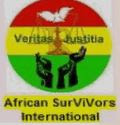
SurViVors SPEAK OUT - Rights of Victims Seeking Justice and Compensation for the RPF Genocide. This is an Exciting Collaborative Project launched by The AS International Founder Jean-Christophe Nizeyimana, Economist and Human Rights Activist. Join US and Be the First to know about the Mastermind of the Rwandan Genocide Still At large and enjoing Impunity.
Profile
Genocide masterminded by RPF
Human and Civil Rights
Rwanda: A mapping of crimes
KIBEHO: Rwandan Auschwitz
Mass murderers C. Sankara
Stephen Sackur’s Hard Talk.
Prof. Allan C. Stam
Prof. Christian Davenport
The killing Fields - Part 1
The killing Fields - Part II
Daily bread for Rwandans
The killing Fields - Part III
Time has come: Regime change
Drame rwandais- justice impartiale
Sheltering 2,5 million refugees
Latest videos
Rwanda's Untold Story
Rwanda, un génocide en questions
Bernard Lugan présente "Rwanda, un génocide en... par BernardLugan Bernard Lugan présente "Rwanda, un génocide en questions"
Nombre de Visiteurs
Pages
Popular Posts - Last 7 days
-
[Since 1994, the world witnesses the horrifying Tutsi minority (14%) ethnic domination, the Tutsi minority ethnic rule with an iron hand,...
-
[Since 1994, the world witnesses the horrifying Tutsi minority (14%) ethnic domination, the Tutsi minority ethnic rule with an iron hand,...
-
Professor and Constitutional Criminal Lawyer Peter Erlinder is interviewed by host Karen Redleaf. Watch this video to understand: http://ou...
-
AS International survivors are sincerely thankful for the Guardian Great Job in revealing some Truth about the Rwandan genocide. By Hele...
-
[Since 1994, the world witnesses the horrifying Tutsi minority (14%) ethnic domination, the Tutsi minority ethnic rule with an iron hand,...
-
<===Mon oeil! *** Once uncovered, the Impostor will always flee, but he may return in another form, believe me! *** Depuis quelques jou...
-
[Since 1994, the world witnesses the horrifying Tutsi minority (14%) ethnic domination, the Tutsi minority ethnic rule with an iron hand...
-
[Since 1994, the world witnesses the horrifying Tutsi minority (14%) ethnic domination, the Tutsi minority ethnic rule with an iro...
-
This is not an ASI publication. ASI is not responsible for, nor does it endorse, its content. Any views expressed are solely those of the...
-
Les survivants du génocide rwandais INSISTENT sur l'embargo contre le régime nazi du FPR Le Control Arms, qui a révélé ces Affaires, ...











